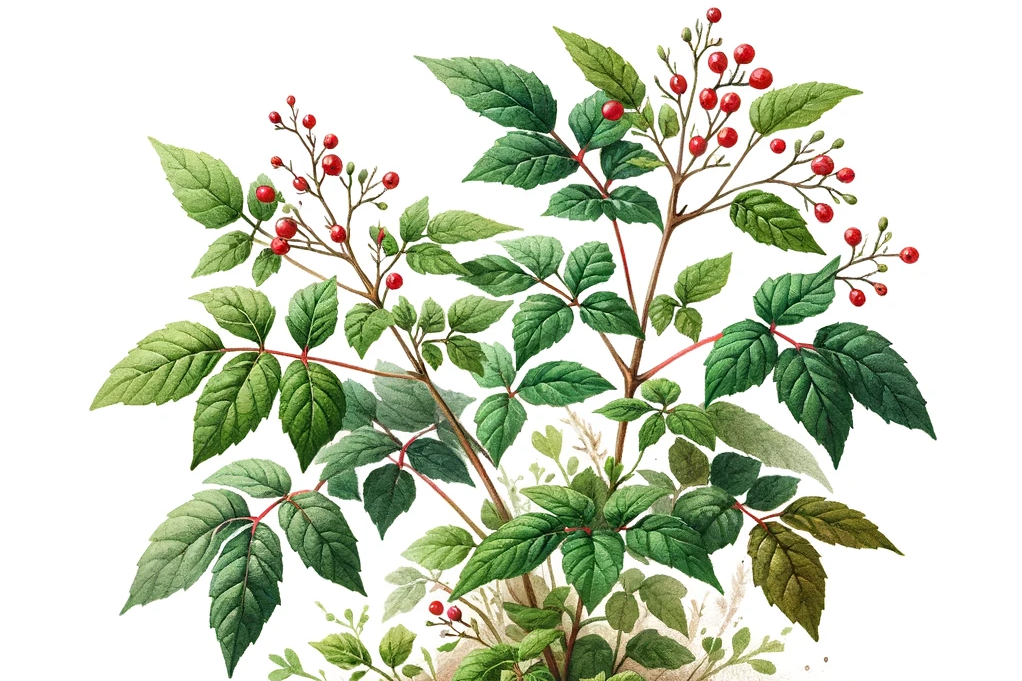Ginseng

Ginseng is a medicinal plant native to Asia that has been used in traditional medicine for centuries. The root contains many valuable ingredients that can have a positive effect on the health and vitality of humans and animals. But is ginseng also suitable for dogs? And what are the advantages and disadvantages of using ginseng for four-legged friends? In this article, you will find out more about this special plant and how you can feed it to your dog.
What is ginseng?
Ginseng belongs to the Araliaceae family and grows mainly in China, Korea and Japan. The plant has green leaves and red berries, but the most important thing is its fleshy root. This has the shape of a human being and is therefore also called "human root". The root can live for up to 100 years and contains many different active ingredients such as ginsenosides, amino acids, vitamins, minerals and trace elements.
What are the benefits of ginseng for dogs?
Ginseng has many positive effects on the organism of dogs. Here are some of them:
- Ginseng has an immunostimulating and body-mobilizing effect. This means that it supports the immune system in its defense against pathogens and helps the dog to have more energy.
- Ginseng has a regenerative effect. This means that it promotes the healing of injuries or inflammation in the body. Ginseng can provide relief, especially for dogs with osteoarthritis or other joint problems.
- Ginseng has an adaptogenic effect. This means that it helps the dog to adapt better to stressful situations and improve its ability to concentrate. This can be helpful for anxious or nervous dogs, for example.
- Ginseng has an antioxidant effect. This means that it protects the cells from free radicals that can be caused by environmental influences or ageing processes. As a result, ginseng can reduce the risk of chronic diseases and slow down the ageing process.
What are the disadvantages of ginseng for dogs?
Ginseng may be a natural remedy, but that doesn't mean it can't have side effects. Here are some possible disadvantages of ginseng in dogs:
- Ginseng can increase blood pressure. This can be problematic for dogs with cardiovascular disease or high blood pressure. Therefore, you should always consult a vet before feeding ginseng.
- Ginseng can interact with other medications. For example, it can strengthen or weaken the effect of blood-thinning or blood sugar-lowering medication. You should therefore always inform your vet if you want to give your dog ginseng.
- Ginseng can trigger allergic reactions. For example, skin rashes or gastrointestinal complaints can occur. Therefore, you should always be careful with the dosage of ginseng and pay attention to possible symptoms.
What is the best way to feed your dog ginseng?
There are various ways to feed your dog ginseng. For example, there are special chewing bones with ginseng extract that can be given as a treat or reward. Or you can buy ginseng powder or capsules and mix them into the food. However, you should always pay attention to the quality and purity of the product and stick to the recommended dosage. This depends on the dog's size, weight and state of health. The rule of thumb is: 10 to 20 milligrams of ginseng per kilogram of body weight per day. However, you should not feed ginseng for more than six weeks at a time to avoid overdosing.
Ginseng is a medicinal plant with many positive effects for dogs. It can strengthen the immune system, promote regeneration, reduce stress and slow down ageing. But it also has some possible disadvantages, such as increased blood pressure, interactions with medication or allergic reactions.
If you notice any signs of hypersensitivity or poisoning in your dog, you should see your vet immediately. We are not a substitute for a vet, but we try to be as accurate as possible. Every dog reacts differently and we recommend you get a second opinion or consult your vet if in doubt.
Stay healthy and take good care of your four-legged friend!😊
Similar to Ginseng
Sleepberry, or ashwagandha, is a plant native to the arid regions of India, the Middle East and parts of Africa. It is known for its robust properties and has been used in traditional Indian...
Roseroot, scientifically called Rhodiola rosea, is a plant native to the cool regions of Europe, Asia and even some parts of North America. Known for its robust, fleshy roots that give off a rosy...
Cleft baskets have a number of positive effects on the health of dogs. For example, it can support and protect liver functionincrease stress resistance and calm the nervesstrengthen the immune...
Cordyceps sinensis is a fungus that grows on certain caterpillars and eats them from the inside out. It is also known as the Chinese caterpillar fungus or doll's leg. The mushroom is mainly found in...



